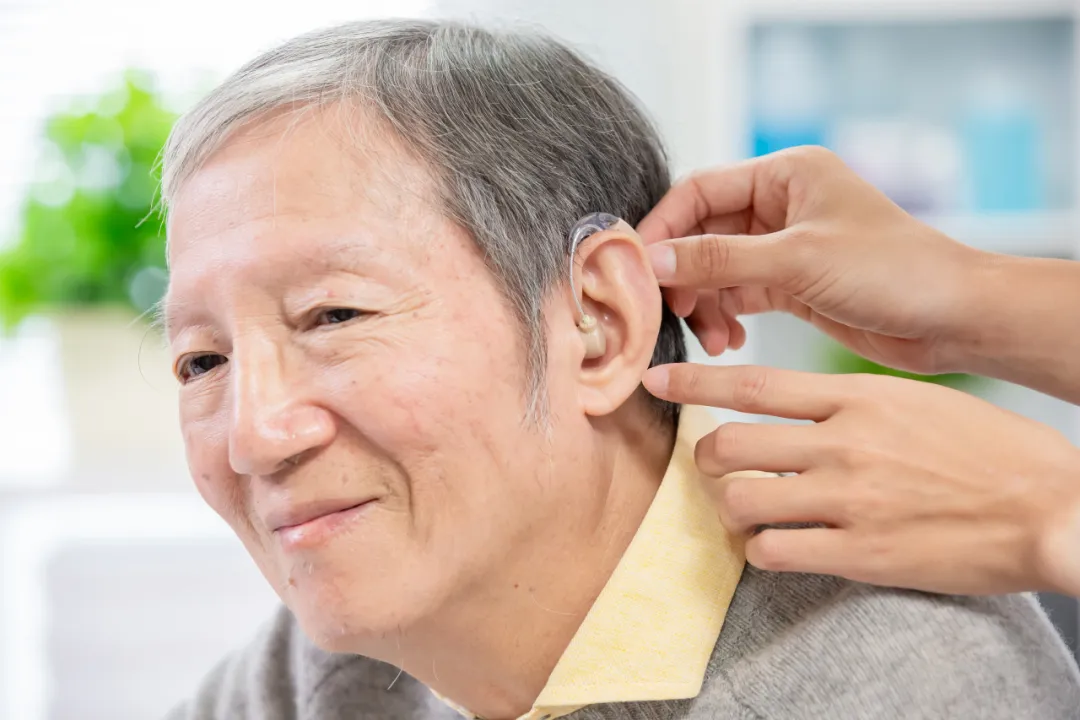source: 仁树医疗 2025-10-29 11:57:33 Secondary reading
Mountains high, chrysanthemums golden;
Year after year, the Double Ninth returns.
Respecting the elderly and cherishing family ties,
Our affections grow even deeper.
Yet as we accompany our parents to climb high and gaze afar, to raise glasses and admire chrysanthemums,
Have we ever suddenly realized—
Some love may have long been blocked by "silence."
When parents start frequently asking, "What did you say?",
When family gatherings become quiet,
When smiles hide the embarrassment of not hearing clearly...
The loss of hearing creeps in silently,
Also separating the closest hearts.
Misunderstood "difficulty hearing" is evolving into loneliness.
Many elderly people do not take "difficulty hearing" seriously.
"With age, hearing loss is normal," they often comfort themselves.
But behind this "normality," age-related hearing loss is quietly at play.
Age-Related Hearing Loss
Medically, the symmetric, progressive sensorineural hearing loss that begins in old age is called presbycusis. This is an auditory dysfunction caused by the aging of the auditory system. Men typically start experiencing hearing decline after around age 45, while women slightly later.
It usually begins with high-frequency hearing loss, so parents often feel "they can hear sounds but not understand the content," like talking through frosted glass.
What truly hurts is not the "difficulty hearing" itself, but the misunderstandings and alienation that follow:
"How many times have I said it, and you still can't remember?"
—Perhaps they never heard you clearly in the first place.
"Why have you become so stubborn now?"
—It might be because they avoid communication due to hearing difficulties.
"Growing increasingly indifferent toward family."
—In reality, they fear exposing the embarrassment of their hearing impairment.
They do not want to avoid communication; they simply cannot communicate smoothly.
Over time, the bridge of family affection is gradually severed by silence.

Hearing loss is not just "ears getting old."
Hearing decline is a gradual process. Over time, it may lead to:
• Hearing speech as if through a fog, especially when multiple people are talking simultaneously;
• Phone and doorbell sounds becoming blurred;
• Frequent mishearing, even interpreting words incorrectly;
• Often accompanied by tinnitus, dizziness, or a heavy-headed feeling.
More importantly, it does not only affect hearing but is also closely related to brain health.
"Nine out of ten deaf people develop dementia" is not an alarmist statement. Increasing medical research confirms: unaddressed hearing loss is a significant risk factor for Alzheimer's disease and cognitive decline.
• Cognitive overload: When unable to hear clearly, the brain expends immense effort to "guess" the content. Over time, cognitive resources are heavily depleted, affecting memory and thinking abilities.
• Social isolation: Hearing difficulties lead to communication challenges, causing the elderly to gradually withdraw from social activities. Social isolation and lack of mental stimulation are breeding grounds for accelerated cognitive decline.
Therefore, protecting hearing is not just about safeguarding the ears but also about preserving parents' brain health and quality of life in their later years.
Hearing aids are the "optimal solution," not the "last resort."
Fortunately, early scientific intervention can significantly slow the progression of hearing loss.
Hearing aids are currently one of the most effective means.
However, many elderly people instinctively resist the idea of "hearing aids," often not due to cost or discomfort but psychological barriers—
"Hearing aids are big and ugly;
Will others laugh at me if they're so noticeable?"
Today's digital hearing aids have evolved—compact, elegant, powerful, with clear sound quality. Some are completely hidden in the ear canal, while others are designed to look like stylish earbuds. Technology has transformed them from "medical devices" into "smart wearable devices."
"Does wearing a hearing aid mean I'm old? Maybe I should wait longer."
On the contrary, proactively choosing a hearing aid is a positive, fashionable lifestyle attitude—a wise move to embrace technology and enhance quality of life. Just as presbyopia requires glasses, hearing loss requires hearing aids; this is a entirely normal physiological need.
Moreover, the earlier hearing aids are worn, the more effectively they maintain the responsiveness of the auditory center. If left unaddressed long-term, the auditory nerves gradually deteriorate due to lack of stimulation. By then, even the most advanced devices may struggle to restore clear hearing.
"I bought one online to try, but why doesn't it work well?"
Hearing aids are not ordinary products but medical devices requiring precise fitting. Randomly purchased products online cannot match each individual's unique hearing curve, naturally making them ineffective.
Hearing aids are not a "label of aging" but a bridge for communication, a key to helping parents reconnect with the world of sound.
So, do not wait until "almost unable to hear" to consider getting hearing aids. When you notice parents:
• Frequently asking for repetition;
• Increasing TV volume louder;
• Reacting slowly to sounds;
• Struggling with phone conversations;
• Gradually reducing social interactions with others...
These may be early signs of hearing decline. At this point, taking them to a professional hearing center for a check-up is the most compassionate care.
In some cases, it may simply be earwax blockage or sequelae of otitis media, which can be resolved with simple treatment.
If it is indeed sensorineural hearing loss, hearing aids should be selected and used consistently as early as possible—this is the scientific way to protect hearing and delay deterioration.